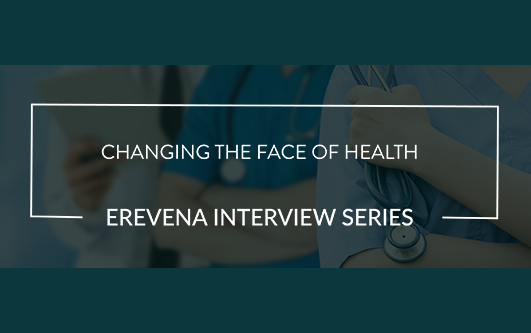Deeply personal and emotional. Nader AlSalim, CEO and founder of Gaia, describes to Hazel Mulhare, Partner at Erevena how a struggle for him and his wife led to a new career that is reshaping access to fertility healthcare, using data, analytics and innovative financial products.
The accidental entrepreneur
From the world of investment banking at Goldman Sachs to empowering a better fertility journey, these two career paths appear to be the absolute antithesis. In Nader AlSalim, however, they have come together to change the future of health in a very personal and emotive area of healthcare.
Nader is the CEO and founder of Gaia (gaiafamily.com), an innovative start-up with the ambition to make IVF accessible, affordable and personal. The company was born out of experience – a bad experience. But Nader is proof positive that the human spirit can turn something painful into something good, as he explains:
“Gaia didn’t come about as the result of some big ambition to build a business. Rather, I take a lot of pride in the fact that it was a natural response to a horrible experience my wife and I had gone through in order to conceive our first child. In this sense, I am a very, very accidental entrepreneur.”
Nader and his wife had four failed IVF cycles over four years, in three different clinics and two countries. The cost of medical bills spiralled to £50,000. Nader continues:
“It’s one of those very few things in life where the pain is multi-faceted – it’s physical, it’s emotional and it’s financial. And Gaia started with the premise that money is a huge pain point for people thinking about or going through IVF treatment.
I was a user, so had a clear understanding of that pain. At the same time, I had a good tool for dealing with it – a data driven approach to understating any problem or risk.”
Finding a better way to access fertility treatment
In accessing other areas of healthcare, few people pay huge sums of money with no real understanding of the outcomes, or even what they are really doing and why. Yet, that’s precisely the situation when it comes to people desperately seeking fertility treatment. Armed with the belief that there had to be a better way to manage what he describes as an ‘horrendous’ process, Nader sought to combine the sort of financial technology that we see in our everyday lives with reproductive health data to design better access to fertility treatments.
It is this data that sits at the heart of Gaia’s approach to how people access fertility healthcare. Indeed, Nader is passionate about the topic of access, believing that the more you know about your own fertility health, the sooner you will be able to access it. That early awareness creates optionality and drives cost down.
He continues: “We began by saying that if we understand a patient’s story, capturing their data and combining it with data from those who’ve been on that journey before them, we can provide them with a personalised prediction of IVF success. However, while that’s clearly valuable, it’s not enough. Why? Here, we have to go back to that big pain point of money – this is a hugely costly process and people typically don’t have enough information or financial means to go through the journey.
We saw an opportunity to provide value to patients by providing personalised predictions that then can lead to tailored financial plans that are insured in case things don’t go as hoped.”
A unique premise built on data and analytics
That’s the premise of Gaia and one that Nader believes is unique in the market. The dataset is continually growing, drawing on both individual personal data, alongside anonymised data from private IVF clinics.
How is this dataset turned into insight? Like many areas within healthcare, artificial intelligence (AI) and machine learning provide the answer. According to Nader, there is a lot of catching up to do collecting data on fertility treatments compared with other medical treatments due to its limited existence and unregulated nature. Nonetheless, he believes Gaia’s predictive technology tool Gabi is changing the game.
“Nothing is going to be 100% accurate when it comes to predicting outcomes, but with Gabi we can inform people’s fertility journeys. I use an analogy of a dark tunnel. We’re not telling people what’s at the end of the tunnel, rather we’re giving them some sort of light to navigate through it. In the past, pretty much the only data point considered was a woman’s age, but that was a lazy proxy. After all, one woman at the age of 35 can be totally different physically and health-wise than another.
We’re completely redesigning this model from scratch. The concept of a woman being the ‘patient’ and receiving treatment is not how we approach things. When you have IVF, you’re not being treated for infertility, it’s more of a process through which you get from A to B faster. Data is the fuel for optimising that process.”
A new conversation about reproductive health
Timing is everything in business and the Gaia journey corresponds with changing patterns of childbirth. The UK’s Office of National Statistics (ONS) reported that the average age of mothers in England and Wales increased to 30.7 years in 2019, which the ONS states is a record high. Compare this with the early 1970s, when the average age was 26.4 years. Nader adds that in London, one in three women delay having their first child until the age of 35.
With fertility rates decreasing as women age, how might this impact Gaia’s growth? Nader says that conversations around reproductive health are far more prevalent today than they were ten years ago. He likens it to the progress of attitudes to mental health, which is now a mainstream conversation. “Our model combines data and predictive analytics access to design insurance products for fertility journeys. This has the potential to be liberating for women as they consider their fertility choices, long before they have to make them.”
This offers Gaia a solid platform for growth, so how is Nader building on that?
“We’re looking to build partnerships with high quality fertility clinics to come onto our platform. The early interest we received from patients and clinics has been overwhelming and from across Europe and now the question is how do we build an infrastructure large enough to support all this demand. Naturally, we’re also building our team to underpin Gaia’s growth and are looking for people who thrive on clarity (of purpose) and complexity (of the challenge we’re addressing).”
His innovative take on insurance is also a launchpad for that growth. “Forget everything you know about insurance,” he says. “Insurers pay out on something bad – you buy insurance hoping it won’t actually happen. We are switching this round by saying that the insurer and the insured want the same outcome, which is a successful birth. We can price this risk in a product that is based on a monthly payment with no upfront charge which makes the cost more manageable. By removing financial ambiguity, households can plan either to go ahead with IVF or not. This is insurance how it should be.”
Simplifying an empathetic user journey
This transparent and simple approach is replicated in the user journey. Nader says that for too long payers and healthcare providers have forgotten the user in the middle. At Gaia, the member (user) is at the forefront of everything they do. From trying, to a successful live birth. This brings us full circle to the data, AI and analytics at the heart of Gaia’s offer. Let’s leave the last word to Nader:
“Information for information’s sake has little value. But if it enables you to make informed decisions, giving you agency over what you do next, then it really has value and enables you to be an active participant in your reproductive health. That’s what we’re doing at Gaia.”
Share this article:












